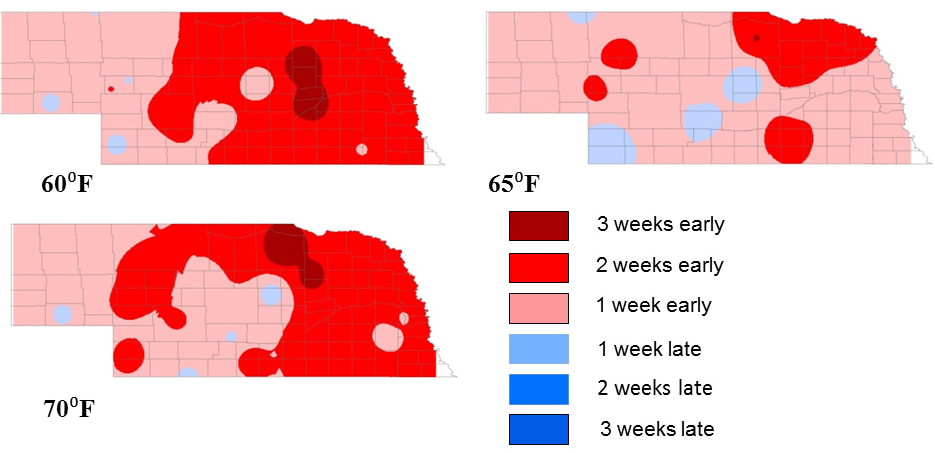
I joined the School of Natural Resources in April 2010 as the Extension educator for climate variability and climate change. I communicate climate variability and change information to a wide range of clientele, from agricultural producers to the general public in communities across the state. Here are some of the extension programs that I am leading:
Talking to Nebraskans About Climate Change
As part of my regular Extension work and as part of the Chancellor’s Speakers Bureau, I give many talks on what climate change means to Nebraska. I’ve spoken to groups such as the Kiwanis Club, Nebraska Citizens for Science, and Legacy Estates in Lincoln, and to the Holdrege Water Conference in 2011, and to the Scottsbluff Master Gardeners.
A lot of producers are less interested in the global scenario than in what climate change means for them. I analyzed recent changes in the climate at the regional scale and how climate information can be utilized for agricultural decision making. I analyzed soil temperature data with co-authors Ken Hubbard and Martha Shulski for the entire state of Nebraska to answer questions such as “When does the soil temperature become suitable for planting agricultural and horticultural crops in Nebraska?” and “Are the optimum soil temperatures for planting spring and summer crops shifting to earlier or later dates?” In general, the spring planting season has been coming earlier in the year for warmer season crops like corn, soybeans and sorghum. If climatic conditions are closely monitored and farmers can plant earlier, they could choose a longer season hybrid with a corresponding higher yield potential.
It is a great experience to see the level of interaction and engagement of different communities in the climate change issue through these talks. I always focus on communicating science-based, unbiased climate change information. It spurs questions and discussions, which gives me an opportunity to understand the community’s point of view.
Climate Masters of Nebraska
Climate Masters of Nebraska is a collaborative project between UNL Extension, the National Drought Mitigation Center, and the High Plains Regional Climate Center. It is a community-focused, action-based climate change project where participants learn about the basic science of climate change and ways in which they can reduce their carbon footprint. This project is funded through the Environmental Protection Agency for two years, but I expect to see it become an integral part of the climate extension program at UNL.
The project will teach 50 community volunteers how individuals can reduce greenhouse gas emissions. In exchange, volunteers must commit to providing 30 hours of education to others in the community. Cleaner Greener Lincoln, the mayor's sustainability initiative, is a project partner. Classes will focus on the basics of climate change, home energy, transportation, green building, renewables, yards, consumption and waste, food, home water conservation, preparing for climate change, consultations and outreach and offsets.
The first 10-week Climate Masters course began earlier this month, meeting one evening per week, and will include field trips to locations such as a landfill. A second round of training will begin in January 2013.
Ensuring Sustainable Agriculture in the Face of Changing Climate
I have recently been awarded a grant from the U.S. Department of Agriculture North Central Region Sustainable Agriculture Research and Education Program (NCR-SARE) for "Ensuring Sustainable Agriculture in the Face of a Changing Climate." This project has been named the 2011 Paula Ford Professional Development Program Proposal of the Year.
This project will provide regionally tailored climate change and sustainable agriculture professional development for Extension and Natural Resources Conservation Services educators across all 12 states in this region. I am working with Julie Doll at Michigan State University to create a Climate Change and Sustainable Agriculture Resource Handbook by compiling credible, science-based resources that are tailored to regional needs. Core curriculum lessons on climate change and agriculture will be developed for use during farmer meetings or agricultural programs. Most importantly, we will organize and host two climate change and sustainable agriculture workshops — one here in Lincoln and one in Lansing, Mich. — for educators across 12 states. This project will increase multi-state extension and outreach collaboration on sustainable agriculture and climate change and will help educators develop programs for farmers on sustainable agriculture that focus on maintaining yields and healthy ecosystems in the face of a changing climate.